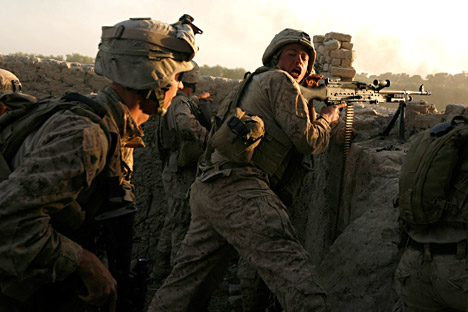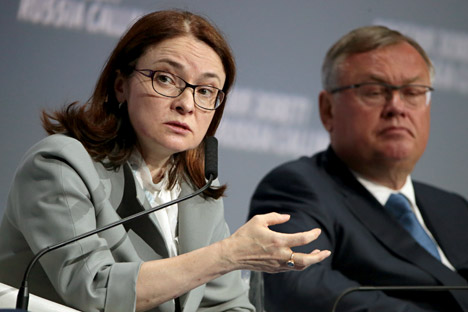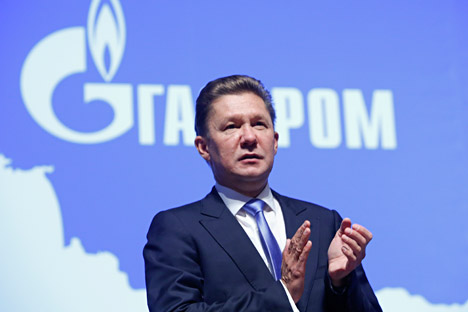Press Digest: Is U.S. decision to keep troops in Afghanistan related to Russia?

U.S. marines fire during a Taliban ambush as they carry out an operation to clear an area in Helmand province, October 9, 2009. Source: Reuters
ReutersU.S. is staying in Afghanistan because of Russia
The online newspaper Vzglyad writes that U.S. President Barack Obama, breaking his election promise, has officially announced that he has changed his mind about withdrawing troops from Afghanistan.
"The situation in Afghanistan is fragile, there is the risk of deterioration. This mission corresponds to the vitally important interests of our national security," explained the American president. Obama did not rule out that the U.S. would leave its troops in Afghanistan for an indefinite term. Russian observers believe this is related to Russia's actions in Syria.
"The U.S. is afraid of losing its influence in Afghanistan. They seriously fear that this vacuum would be filled. Russia is establishing good relations in the region with India and Iran, which also want to have an impact on the situation in Afghanistan. Certainly this triangle is not anti-American, but it is not American," said Alexander Perendzhiev, an expert at the Association of Military Political Analysts and professor of political science and sociology at the Plekhanov Russian University of Economics.
"Some time ago the U.S. had the image of a leading country in the fight against terrorism. If it now withdraws its troops from Afghanistan, then all the projects concerning the fight against terrorism will fall apart," he said.
Yatsenyuk threatens legal action against Russia over Crimea and Donbass
The Svobodnaya Pressa publication reports that Ukrainian Prime Minister Arseniy Yatsenyuk has once again raised the issue of Ukraine's 3-billion-euro debt to Russia.
Yatsenyuk essentially made Moscow an ultimatum: "If Russia thinks it is normal, then we invite them on October 29 to assume the conditions that all of Ukraine's creditors have taken," he said in a briefing in Kiev on Oct. 15.
If Russia, according to Yatsenyuk, considers itself "unique," then it will become victims of a "legal war,” plus a 3-trillion-hryvnia ($47 billion) lawsuit for its actions in Crimea and the Donbass.
"I would agree that Russia is now faced with a choice: write off a part of its debt or face a "legal war," said Mikhail Remizov, President of the Institute of National Strategy.
"The IMF is also faced with a choice. Either it violates its own law and continues giving Ukraine credit or it abides by its principles and stops giving Kiev money. And then Ukraine will return to the position that it must recognize the debt and pay it off. That is why it is necessary here to accept the juridical confrontation."
ISIS control over Syrian hydrocarbons is hurting Russia
The centrist newspaper Nezavisimaya Gazeta writes that after the U.S. refused to meet a Russian delegation there will clearly be no contacts on the fight against Islamic State (ISIS), except, possibly, the signing of a document on safe flights over Syria. Also, according to a military-diplomatic source, "there will be no division of the sky over Syria.”
"The Russian air force is conducting military missions there that are coordinated with the Syrian General Staff and the country's military-political administration," said the source, indicating that Damascus is the only legitimate body that has the right to determine Syria's military plans.
Military expert Lieutenant General Yury Netkachev remarks that Syrian opposition forces, which are supported by the U.S., as well as ISIS militants, have seized almost all of Syria's hydrocarbon deposits, whose pipelines stretch to oil refineries in the western part of the country, in zones still controlled by government forces.
"The mass media talked about [Syrian leader Bashar al-] Assad having already been forced to buy dumping oil from the Mujahedeen [Islamic fighters]. This oil is sold cheaply on world markets, driving down hydrocarbon prices. And this is very beneficial for the Americans because it does significant economic damage to Russia, which, unfortunately, is still dependent on oil," said Netkachev.
The lieutenant general pointed to the information circulating in the mass media about America's special operations in Syria. The media says that U.S. special forces are fighting in the rear and that their "aim is not military objects and not the ISIS supply system, but political centers that issue all types of information in all types of media."
In the province of Deir ez-Zor, U.S. special forces have killed one of the heads of the militants, who was selling dumped oil. His wife was taken prisoner and documents on the sales were seized.
All rights reserved by Rossiyskaya Gazeta.
Subscribe
to our newsletter!
Get the week's best stories straight to your inbox

